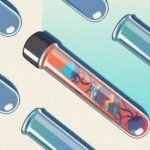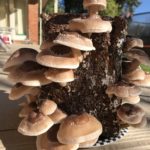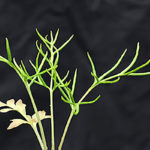In Nature Plants, the JGI helped drive the discovery into the role sphagnum’s sex chromosomes play in carbon sequestration.
A Biofuel Breakthrough, Courtesy of Fungi
It’s a tough job, but someone’s got to do it. In this case, the “job” is the breakdown of lignin, the structural molecule that gives plants strength and rigidity. One of the most abundant terrestrial polymers (large molecules made of repeating subunits called monomers) on Earth, lignin surrounds valuable plant fibers and other molecules that could be converted into biofuels and other commodity chemicals – if we could only get past that rigid plant cell wall.
JGI Researchers Trace the Evolution of Shiitake Mushrooms
These fungi are part of the genus Lentinula, which have evolved to decompose hardwoods on every continent besides Europe and Antarctica. Lentinula mushrooms are white rot fungi, belonging to an elite group of decomposers that can break down all of wood’s components — cellulose, hemicellulose, and the toughest molecule, lignin. Understanding Lentinula genomes and their evolution could provide strategies for converting plant waste into sugars for biofuel production.
JGI Reveals DNA Thievery in Ferns
The undeniable power of plants, and the lessons they can teach us, are why the JGI took on the Open Green Genome Initiative in 2018 as part of its Community Science Program. A recent paper published in Nature Communications on Ceratopteris richardii marks the first published manuscript of a genome sequence generated through the OGG and solves an ongoing mystery in ferns.
JGI Helps Shed Light on How Antarctic Algae Have Adapted to Cold
In Nature Ecology and Evolution, researchers from the Chinese Academy of Fishery Sciences, the University of East Anglia, and the JGI have explored the genome of the polar algae Microglena sp. YARC. The green alga harbors extra genes for proteins requiring zinc, and those genes turn out to be key for the phytoplankton’s ability to live in cold polar waters. Learn more here on the JGI website.
Was this page useful?


![Image featuring S. divinum (red) and S. angustifolium (green)]](https://biosciences.lbl.gov/wp-content/uploads/2023/04/Screen-Shot-2023-02-22-at-4.57.35-PM-150x150.png)





